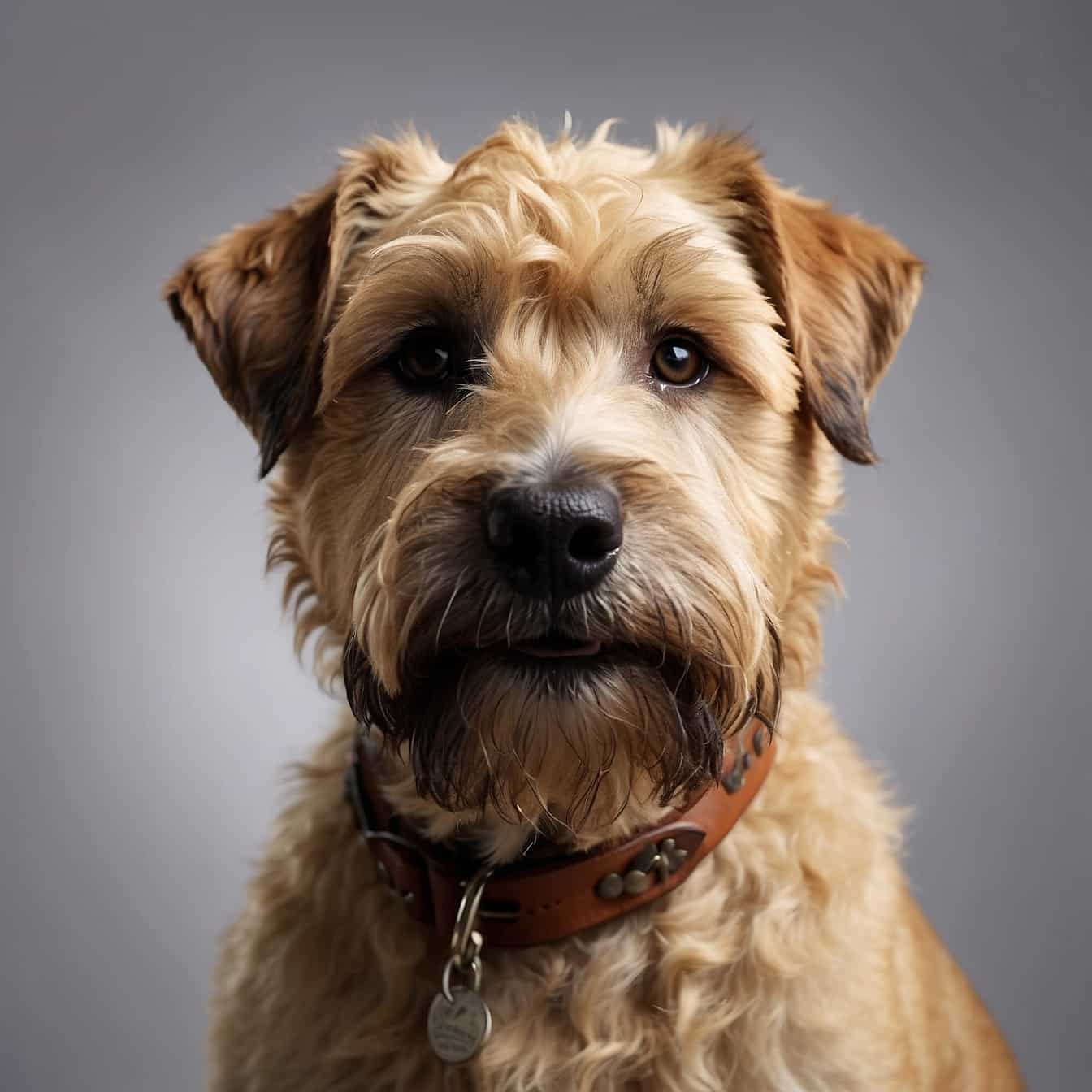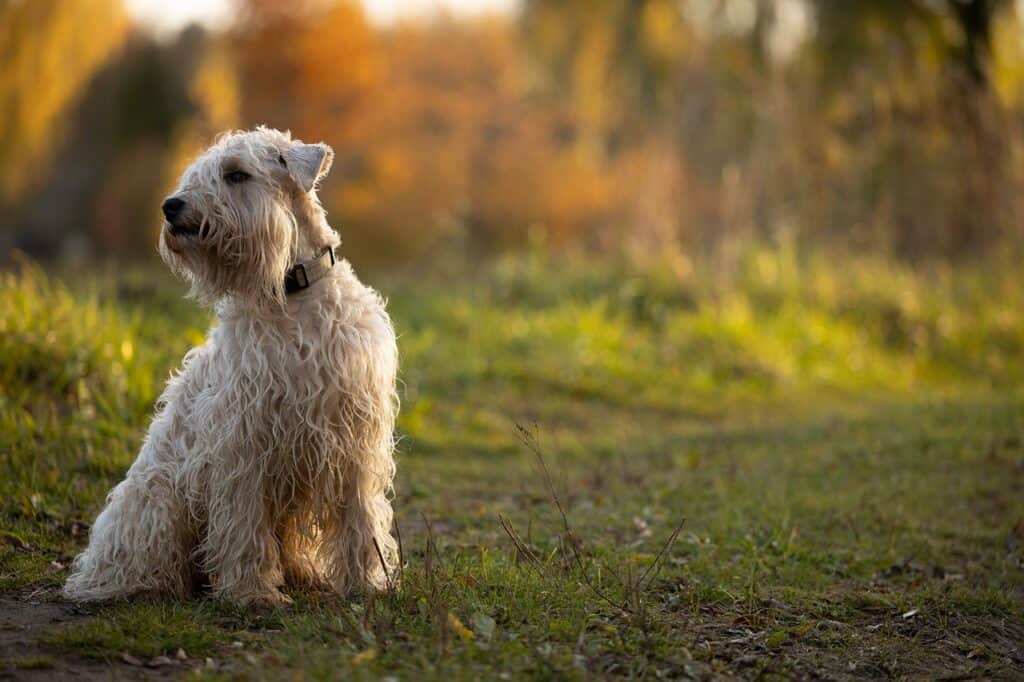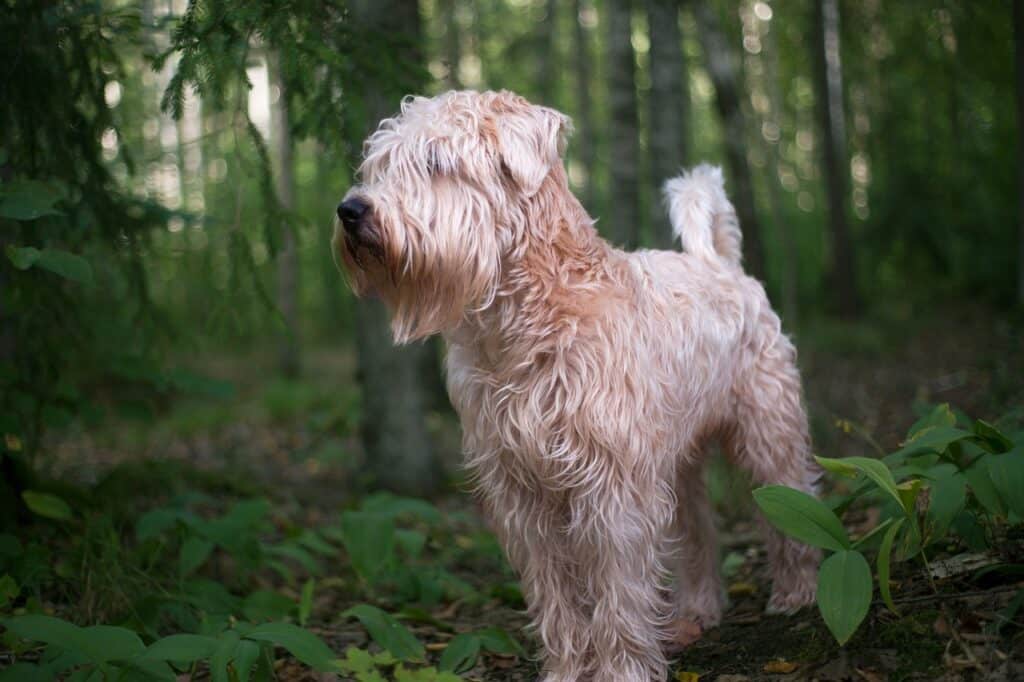The Soft Coated Wheaten Terrier, characterized by its silky and wavy coat, is a friendly and adaptable breed with Irish origins. Known for its playful demeanor and affectionate nature, this terrier makes an excellent family companion. With its distinct appearance and charming personality, the Soft Coated Wheaten Terrier brings joy and warmth to households seeking a loving and lively canine friend.

| Category (Explanation) | Breed Information |
|---|---|
| Year of Breed Conception | 1700s |
| Country of Origin | Ireland |
| Weight (lbs & kg) (Male) | 35-45 lbs (16-20 kg) |
| Weight (lbs & kg) (Female) | 30-40 lbs (14-18 kg) |
| Coat Type | Soft, silky, and wavy |
| Color Variations | Wheaten (pale gold to reddish-brown) |
| Shedding Level (Low, Moderate, High) | Low to Moderate |
| Height (cm & in) | 18-19 inches (46-48 cm) |
| Breed Size | Medium |
| Trainability (Low, Moderate, High) | High |
| Mental Needs (Low, Moderate, High) | Moderate |
| Intelligence Level (Low, Moderate, High) | High |
| Energy Level (Low, Moderate, High) | Moderate to High |
| Agility (Low, Moderate, High) | Moderate |
| Loyalty (Low, Moderate, High) | High |
| Playfulness (Low, Moderate, High) | High |
| Exercise Needs | Regular exercise and playtime |
| Guarding Proficiency (Low, Moderate, High) | Moderate |
| Sociability with Children (Low, Moderate, High) | High |
| Barking Level (Low, Moderate, High) | Moderate |
| Digging Tendency (Low, Moderate, High) | Moderate |
| Destructive Behavior (Low, Moderate, High) | Moderate |
| Drooling Level (Low, Moderate, High) | Low |
| Obedience Level (Low, Moderate, High) | High |
| Apartment Friendly (Yes/No) | Yes, with sufficient exercise |
| Inherent Prey Drive | Moderate |
| Physical Risk to Others (Low, Moderate, High) | Low |
| Travel Fatality Risk (Low, Moderate, High) | Low |
| Allergen Potential | Low to moderate |
| Health Concerns (List of Common Health Concerns) | Protein-Losing Nephropathy, Addison's Disease |
| Average Life Expectancy (Life Expectancy in Years) | 12-15 years |
Woof Mastery is reader supported and our articles may contain affiliate links.
Instead of running third party ads that we have no control of we only use links from high-quality companies we are directly partnered with. Making use of these links come at no cost to you our reader, and in many cases have the extra benefit of discounted rates or sign up bonuses.
If you’re interested you can read more about our affiliate policy here.
We appreciate your support and always insure that the products and services we recommend are high-quality, helpful and relevant to the subject at hand!
The Soft Coated Wheaten Terrier has a history rooted in Ireland, where it was traditionally used as a farm dog. Bred for its versatility, this terrier assisted with herding, guarding, and hunting small game. Its distinctive silky, wheaten-colored coat became a hallmark of the breed. Over time, the Soft Coated Wheaten Terrier transitioned into a beloved companion, valued for its friendly nature, intelligence, and adaptability. Its history reflects its journey from a versatile working dog to a cherished member of families around the world.

The Soft Coated Wheaten Terrier is special for its friendly nature, adaptability, and distinctive silky coat. Bred for versatility on the farm, this terrier has transitioned into a cherished family companion. What sets it apart is its loving and playful disposition. The Soft Coated Wheaten Terrier’s ability to bring joy and warmth to its family, coupled with its unique appearance, makes it a special and endearing member of households. Its friendly demeanor and delightful personality contribute to its special status as a loving and spirited canine friend.
The Soft Coated Wheaten Terrier’s traditional role is rooted in its history as a versatile farm dog in Ireland. Bred for herding, guarding, and hunting small game, this terrier showcased its adaptability and friendly nature. Over time, it transitioned into a cherished family companion. The Soft Coated Wheaten Terrier’s traditional role continues today as a loving and adaptable member of households, offering its friendly demeanor and intelligence to families worldwide. Its distinctive silky coat and joyful personality contribute to its traditional role as a delightful and spirited canine friend.
Soft Coated Wheaten Terriers are known for their friendly nature, adaptability, and distinctive silky coat. Bred for versatility on the farm, they have transitioned into cherished family companions. These terriers are characterized by their loving and playful disposition. Soft Coated Wheaten Terriers bring joy and warmth to their families, showcasing a friendly demeanor and delightful personality. Despite their elegant appearance, they possess a down-to-earth nature. With their endearing qualities and joyful spirit, they become special and beloved members of households around the world.
Soft Coated Wheaten Terriers are known for their friendly and adaptable temperament. Bred for versatility on the farm, they showcase a loving and playful disposition. With proper training and socialization, they become well-mannered family companions. Soft Coated Wheaten Terriers are typically affectionate with their families and enjoy play and activities. Proper introductions are important around other dogs. With their joyful spirit and friendly demeanor, they bring warmth and companionship to households. With consistent positive reinforcement, Soft Coated Wheaten Terriers develop into delightful and spirited family members.
Soft Coated Wheaten Terriers are medium-sized dogs with a well-balanced and square build. They have a distinct head with a short muzzle and a moderately defined stop. Their eyes are dark and expressive, and their ears are small and folded forward. The breed is known for its soft, silky coat that comes in various shades of wheaten, ranging from pale beige to shimmering gold. Soft Coated Wheaten Terriers have a straight back, a high-set tail, and a lively gait. They convey a sense of friendliness, charm, and a distinctive coat texture.
Soft Coated Wheaten Terriers come in various color variations, contributing to their friendly and warm appearance. The most common color variations for Soft Coated Wheaten Terriers include:
Soft Coated Wheaten Terriers are known for their wheaten coat, which ranges in shades from pale beige to shimmering gold. The coat is soft, silky, and typically lacks an undercoat. While the breed standard specifies a wheaten color, individual dogs may exhibit variations in shade. Puppies are often born darker before lightening as they mature. The breed’s distinct coat texture, along with its friendly expression and playful demeanor, makes it an appealing and cherished companion.
Soft Coated Wheaten Terriers have a moderate shedding level. While they are not heavy shedders, their soft, silky coat does shed to some extent. Regular grooming is essential to manage shedding and prevent matting. Brushing the coat a few times a week helps remove loose fur and keeps the coat in good condition. While Soft Coated Wheaten Terriers have a moderate shedding level, grooming practices are crucial to ensure their coat remains healthy and attractive.
Soft Coated Wheaten Terriers have a soft, silky coat that requires regular grooming to keep it in good condition. Here are some grooming habits for Soft Coated Wheaten Terriers:
Soft Coated Wheaten Terriers have a moderate to high activity level. These medium-sized terriers enjoy regular exercise, including walks, playtime, and activities that challenge them physically. Providing mental stimulation through training sessions and interactive toys is important for their well-being. Soft Coated Wheaten Terriers may excel in various dog sports and activities, making them suitable for owners who enjoy an active lifestyle.
Soft Coated Wheaten Terriers exhibit intelligence in their friendly and amiable demeanor. Their problem-solving abilities and adaptability contribute to their trainability. Positive reinforcement training methods and engaging activities ensure they stay mentally stimulated. Their soft coat and charming personality add an endearing quality to their overall intelligence.
Soft Coated Wheaten Terriers benefit from mental stimulation. Engage them in activities like puzzle toys, interactive games, and obedience training to challenge their minds. Regular social interaction is crucial, as they are social dogs. Obedience training contributes to mental stimulation and strengthens the bond with their owners. Offering a routine, affection, and a safe environment contributes to their overall mental well-being.
Enter The Woof Mastery

Before welcoming a Soft Coated Wheaten Terrier into your home, consider the following:
Soft Coated Wheaten Terriers, known for their friendly nature, generally pose a lower physical risk to others. Proper socialization and training from an early age can help mitigate any potential risk. Owners should be aware of their dog’s interactions and take necessary precautions to ensure they do not unintentionally cause harm.
Soft Coated Wheaten Terriers, known for their friendly nature, can be good family pets. Supervision is important, especially due to their energy levels. Proper socialization from an early age is essential to ensure they interact well with children. Obedience training can help curb any exuberant behavior, and they may form strong bonds with the kids in their family.
Soft Coated Wheaten Terriers may have mixed responses to water. While some may enjoy swimming, others may not be as comfortable. If you plan to introduce them to water, do so gradually and observe their comfort level. Use a canine life vest if swimming in open water or deep pools to ensure their safety.
Remember that Soft Coated Wheaten Terrier puppies, like all puppies, are eager to please and learn. Positive and consistent training practices will help them become well-behaved, obedient, and happy adult dogs. Building a strong and trusting bond with your puppy through training is a rewarding experience for both you and your canine companion.
Soft Coated Wheaten Terriers may bark, especially if they are excited or perceive a threat. Training and socialization are essential to manage their barking tendencies. Positive reinforcement methods can be effective in shaping their behavior and preventing excessive barking.
Soft Coated Wheaten Terriers thrive in homes with active families. They do well in houses with yards but can adapt to apartment living with regular exercise. Regular grooming is essential for their distinctive coat. Socialization is crucial to prevent aggressive behavior. Positive reinforcement training is effective in shaping their behavior.
When traveling with Soft Coated Wheaten Terriers, consider their size and grooming needs. Use a secure travel crate or restraint for their safety. Plan for breaks during the journey for stretching and bathroom breaks. Address any potential anxiety through positive associations with travel and familiar items. Regular grooming may be required, so plan accordingly. Choose airlines with policies suitable for medium-sized breeds if flying and comply with crate requirements for air travel safety.
Soft Coated Wheaten Terriers may be prone to specific health concerns. While not all individuals will experience these issues, it’s essential for owners to be aware of potential health problems and work with veterinarians to maintain their pets’ well-being. Common health concerns in Soft Coated Wheaten Terriers include:
Regular veterinary check-ups, a balanced diet, proper exercise, and responsible breeding practices can help mitigate some of these health concerns. It’s crucial for Soft Coated Wheaten Terrier owners to work closely with their veterinarians to monitor their pets’ health and address any issues promptly.
Proper nutrition is crucial for the health and well-being of Soft Coated Wheaten Terriers. Here are some nutritional habits and best practices to consider for this breed:
Breed-Specific Laws (BSL): Soft Coated Wheaten Terriers may be subject to breed-specific laws (BSL) in certain areas. These laws are often enacted at the local or municipal level and can vary widely from one jurisdiction to another.
Types of Restrictions: The specific restrictions imposed on Soft Coated Wheaten Terriers under BSL can include mandatory spaying/neutering, special licensing, liability insurance requirements, muzzling in public, and, in some cases, bans on ownership. The severity of these restrictions depends on local regulations.
Rationale for BSL: BSL is typically implemented based on concerns about public safety and perceived risks associated with specific breeds, often due to incidents involving dog attacks. While Soft Coated Wheaten Terriers are not inherently aggressive, they can be affected by BSL due to their physical resemblance to breeds that are sometimes included in these laws.
Controversy: It’s important to note that BSL is a controversial topic. Critics argue that it unfairly targets breeds rather than addressing individual dog behavior and that responsible ownership and training should be emphasized instead of breed-specific restrictions.
Local Regulations: To determine if there are breed-specific laws or restrictions regarding Soft Coated Wheaten Terriers in your area, you should check with your local animal control or government authorities. Be aware of and comply with any local regulations to ensure that you are in compliance with the law while owning a Soft Coated Wheaten Terrier.
Woof Mastery is reader supported and our articles may contain affiliate links.
Instead of running third party ads that we have no control of we only use links from high-quality companies we are directly partnered with. Making use of these links come at no cost to you our reader, and in many cases have the extra benefit of discounted rates or sign up bonuses.
If you’re interested you can read more about our affiliate policy here.
We appreciate your support and always insure that the products and services we recommend are high-quality, helpful and relevant to the subject at hand!
Myth 1: Soft Coated Wheaten Terriers are High-Maintenance in Grooming
Myth 2: They Don’t Get Along with Children
Myth 3: Soft Coated Wheaten Terriers are Not Intelligent
Myth 4: They are Prone to Aggressive Behavior
Myth 5: Soft Coated Wheaten Terriers Don’t Need Exercise
Myth 6: They are Not Suitable for Apartment Living
Myth 7: Soft Coated Wheaten Terriers are Prone to Health Issues
Myth 8: They are Not Good Guard Dogs
Myth 9: Soft Coated Wheaten Terriers Shed Heavily
Myth 10: They are Not Good with Other Pets
These myths underscore the importance of understanding individual dogs and providing them with appropriate care, training, and socialization. Soft Coated Wheaten Terriers, when well-cared-for, can be delightful and loving companions.
Famous Soft Coated Wheaten Terrier examples include:
Wheaten Willie: Wheaten Willie, a Soft Coated Wheaten Terrier, became known as the official mascot of the Wheaten Terrier Club of America. Willie’s charming personality and participation in events made him a beloved figure among Wheaten Terrier enthusiasts.
The Soft Coated Wheaten Terrier is culturally significant as a breed with a friendly and affectionate nature. Recognized for their soft, silky coat and playful demeanor, Wheatens have become cherished family pets. Their presence in popular media, including advertisements and films, contributes to their cultural appeal. Soft Coated Wheaten Terriers are symbols of warmth and companionship, finding appreciation among those who value their loving and spirited qualities.
Famous historical owners of Soft Coated Wheaten Terriers are not as extensively documented, but these friendly and affectionate dogs have become cherished family pets. Their delightful presence and loving nature make them popular companions in households around the world.
Soft Coated Wheaten Terriers, like many breeds, have encountered challenges over the years. Some notable challenges include:
The Soft Coated Wheaten Terrier is a breed that originated in Ireland and was developed for farm work. It is believed to have been created through the combination of several breeds, including:
Soft Coated Wheaten Terriers are charming and adaptable companions that bring warmth and joy to any home. Known for their friendly disposition, they make excellent family pets. Their adaptability to different living conditions allows them to thrive in various settings. Engaging in activities that cater to their energetic nature and providing them with opportunities for interaction enhances their well-being and strengthens the bond they share with their families. With their distinctive appearance and playful personality, Soft Coated Wheaten Terriers become cherished members of the household, offering both companionship and delight.